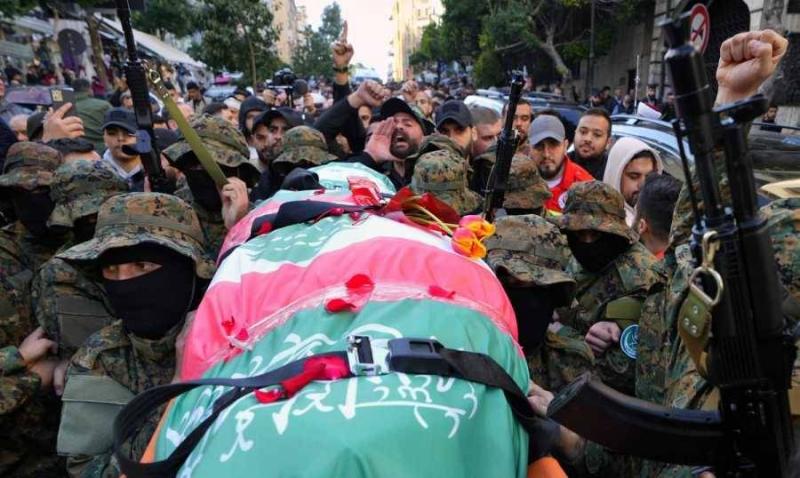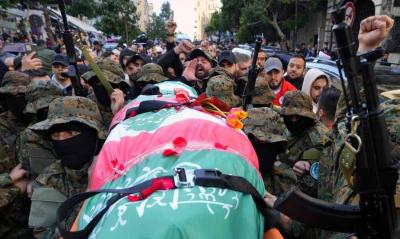The armed presence in the capital, Beirut, specifically in the Tarik Jdideh area, during the funeral of an Islamic group member who fell in the south, has raised concerns among the city's residents about returning their city to a state of chaos. This is especially true given the state's inability to confront this phenomenon, whether in Beirut or other Lebanese cities and regions. The Islamic Group - Fajr Forces buried three of their fighters who fell on Sunday in the south: Mohammad Riyad Mohieddine from Beirut, Hussein Hilal Darwish from the town of Shihime (Mount Lebanon), and Mohammad Jamal Ibrahim from the town of Al-Habbariyeh (the south). The funeral procession was marked by the presence of dozens of masked armed men, which some interpreted as a show of force.
Ali Abu Yassin, head of the political office of the Islamic Group, justified the incident in a statement to Asharq Al-Awsat, saying: "We are facing a looming danger, confronting a Zionist enemy that commits massacres daily in Lebanon and Palestine." He indicated that the Islamic Group has taken on the path of defending Lebanon against this aggression, asserting that "we are in a state of war with an enemy that has crossed all lines." Abu Yassin assured that the Islamic Group is not displaying military power in Beirut and that the armed appearance is only a reaction from the comrades of the martyrs to the event, stressing that the message is directed to the Israeli enemy, not to the Lebanese people. He added: "Our project has been and remains building the state and true partnership with all Lebanese components, and we demand, at this critical moment, unity among the Lebanese in the face of the Israeli enemy and its projects."
Beirut has not witnessed an armed display since the end of the civil war, except on May 7, 2008, when Hezbollah and its allies carried out a military incursion into the capital. Beirut Deputy Melhem Khalaf deemed the armed display as indicative of an unhealthy situation in the country. He stated: "If there are military actions on the borders with the Israeli enemy, the armed display in the capital is unjustified." Khalaf emphasized the need to restore a strong, capable, and just state that protects all its citizens, noting that any absence of the state detracts from the security and reassurance of the Lebanese in the capital and all regions.
Lebanese citizens fear a return to security chaos, particularly as the state is preoccupied with military developments in the south and anticipating the escalation of Israeli actions. Former Minister Rashid Darbas placed the military display in Beirut during the funeral in the context of a show of force for a particular group. He clarified to Asharq Al-Awsat that this armed appearance does not mean that Beirut will regress back to an era of armed chaos. He stated: "Chaos is not decided by a specific group, but is enacted by major countries if they wish to spread chaos throughout Lebanon." Darbas underscored that the Lebanese Army and legitimate security forces possess the capacity and courage to curb any attempt to disrupt security and turn back the clock.
Military and strategic expert, Brigadier General Khaled Hamada, presented a different reading of the state's ability to maintain security, noting that the Islamic Group has chosen to operate armed under the umbrella of Hezbollah. He explained that their role in the south revolves around adopting the resistance project and conveying a message that Hezbollah is not alone in facing Israel, as Sunnis are also engaged with it. He expressed to Asharq Al-Awsat his regret that the state's capacity to ensure security is extremely limited. He pointed out that official security in Lebanon is almost absent, and where there are safe areas, it is due to people's commitment to security and law and their lack of affiliation with militias.




